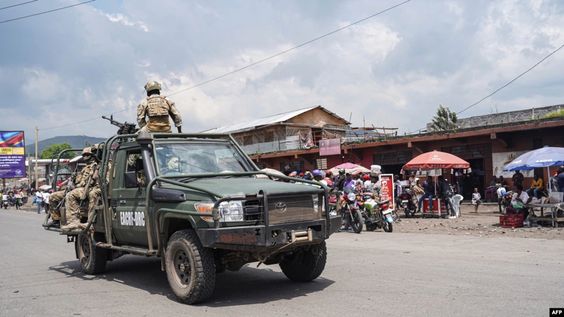Africa
UN Specialists Cite Rwanda’s Contribution to the East DR Congo Rebel Crisis

In the volatile east of the country, the Rwandan army “engaged in combat operations” against the DR Congo’s military, according to a report by a team of impartial United Nations specialists that was read by Agence France-Presse on Thursday.
The experts said that there was “strong evidence” that the Rwandan army had actively helped the M23 rebels in the Congo by giving them uniforms, guns, and ammunition.
Claims that Rwanda helped the rebels were denied by a government official in Kigali, who also declined to say anything until the official findings were made public.
Several times, the Democratic Republic of the Congo has charged Rwanda with supporting M23.
Since the militia woke up late last year in the troubled east of the DRC, it has taken control of large areas of land.
A commercial hub with more than 1 million residents, Goma, is 20 kilometers from the battle lines at this time.
Although Rwanda has frequently denied supporting the rebels, other Western nations like the United States and France have agreed with the DRC’s judgment.
According to the U.N. experts’ report, Rwanda’s military also attacked the Democratic Forces for the Liberation of Rwanda (FDLR), an offshoot of the Rwandan Hutu extremist groups responsible for the 1994 Tutsi genocide.
The investigation found that Rwanda sent the M23 more troops “for specific operations, especially when those operations were meant to take over important cities and territories.”
The report says that in May, Congolese forces were attacked by both M23 rebels and Rwandan soldiers.
The 236-page report for the U.N. Security Council is anticipated to be released soon.
political crisis
Alain Mukuralinda, the deputy government spokesman for Rwanda, said that Kigali had not read the report’s main points or the supporting documentation.
“Today, it is difficult to take a position without seeing the material proof, without reviewing this so-called evidence,” he told AFP.
“We do not support the M23; we do not need it,” he clarified.
The Tutsi-led M23 militia first became known around the world in 2012 when it took over Goma. The next year, it was forced out and went into hiding.
However, it reappeared in late 2021 after the rebels asserted that the DRC had broken a pledge to incorporate them into the army. Since then, it has made great strides.
A turning point was reached in June when M23 forces took control of the vital border town of Bunagana in Uganda.
Late in October, the M23 started a new attack that led to large parts of North Kivu being taken over and hundreds of thousands of people having to move.
The rebels’ victories on the battlefield have made things worse between the DRC and neighboring Rwanda.
In an effort to reduce tensions, a number of diplomatic attempts have been initiated. The seven-member East African Community (EAC) also decided to send a military force into the eastern DRC.
On November 23, a truce was agreed upon following negotiations between the DRC and Rwanda in the capital city of Angola, Luanda.
The agreement required the M23 to lay down their weapons and leave the occupied areas.
But the M23 skirmishes persisted.
Later, Kinshasa charged the M23 with murdering residents in the community of Kishishe.
According to an early U.N. investigation, the M23 was responsible for at least 131 local civilian deaths.
Rwanda declared on Wednesday that the allegations of a massacre were “fabricated.” According to the report, the M23 and militias with ties to Kinshasa engaged in combat.
Militia rotation
In recent weeks, armed groups—of which there are more than 120 in eastern DRC—have engaged the M23 in combat.
The U.N. experts’ study says that the return of the M23 caused local militias to “shift alliances” and create “new dynamics” with the Congolese military.
The experts highlighted proof that the Congolese military had cooperated with armed organizations in their conflict with the M23.
The U.N. experts advised the DRC to “take all steps” to stop collaboration between the military and armed groups in the Congo.
Additionally, they encouraged the 90 million-person Congo’s neighbors to “avoid giving support” to armed organizations there.
In response to a question about the report, the U.S. State Department showed concern and asked all countries to protect “territorial integrity.”
According to current U.N. sanctions resolutions for the DRC, “entry of foreign forces into the DRC must be done transparently with the approval of, and in coordination with, the DRC, and must be pre-notified to the Security Council.”
The United States frequently found the allegations of Rwandan support for the M23 rebels to be credible.
